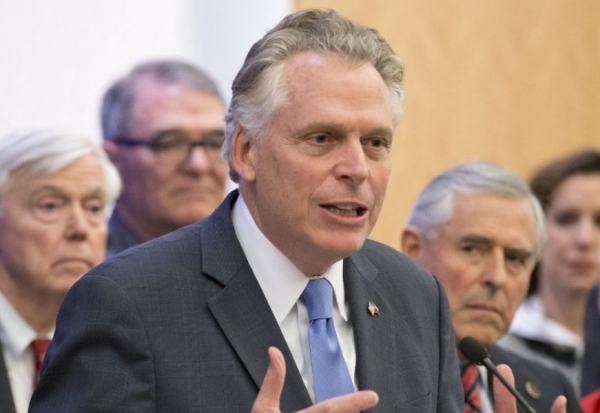McAuliffe attempted to automatically restore the rights of all 200,000 former felons in the state with an executive order back in April — bringing the state in line with nearly 40 others across the country that allow people to become full citizens again after serving their sentences.
But the state’s Republican leaders sued, claiming the governor had overstepped his legal authority. A narrow majority on the Virginia Supreme Court agreed, and the registrations of thousands of ex-offenders who had been hoping to vote for the first time in decades were put in jeopardy.
When McAuliffe attempted to get around the court order by signing each clemency petition individually, the Republican legislators sued him for contempt of court. Had the state Supreme Court accepted their arguments, thousands of ex-offenders in the state could have seen their voting rights re-appear and disappear twice in the span of just a few months.
“These folks are back in our society,” McAuliffe said at a forum in DC on Tuesday. “They have already paid their debt to society. A judge and jury have determined that they are done. They are paying taxes and going to church, why do you possibly not want these folks to vote?”
“No matter your crime, you should not be permanently disenfranchised for the rest of your life,” he added. “Let’s welcome them back as productive members of Virginia.”
“No matter your crime, you should not be permanently disenfranchised for the rest of your life.”
A study earlier this year found that the vast majority of those who can now regain their rights — 80 percent — committed non-violent crimes. Most have been out of prison for more than a decade, and African Americans are disproportionately represented. Forty-six percent of the ex-offenders are black, though blacks make up less than 20 percent of the state’s population.
Theoretically, if all 206,000 ex-offenders register to vote before the October deadline, they could decide who sits in the White House next year. Yet the restoration process has been dramatically slowed down by lawsuits, and it is now estimated that only a small fraction of these residents will be able to vote this fall.
Republicans have accused McAuliffe of restoring this population’s rights in order to help Hillary Clinton, a longtime ally of the governor’s, win the hotly contested swing state in November.
McAuliffe waved away these claims this week, saying he pursued the restoration because it is “morally right.”
“If I was so smart politically,” he added. “I would have done it last year, when I worked my heart and soul out to try to win [Democratic control of] the state senate. I needed just one seat to get Medicaid expansion passed.”
Republicans, in the meantime, have introduced their own proposal for restoring voting rights to some former felons. It would only apply to those convicted of non-violent crimes, and would require them to pay back all of their court fines and restitution money before they could qualify — a policy McAuliffe has compared to a poll tax.
“Under this plan, if you’re 18 years old and you get into a bar fight, you will never be able to vote in the Commonwealth of Virginia. But if you’re Bernie Madoff and you bilked people out of zillions of dollars, you will get your rights back. I don’t think that’s fair,” he said.
McAuliffe explained that it’s important to him to have no legal distinction for voting rights between violent and non-violent criminals. “The American jurisprudence system determines that if you commit a more serious crime, you get a longer sentence,” he said. “You already wait longer to get your rights restored. So I think we should treat everyone the same and restore rights for everyone.”
Link to original article from Think Progress


 Imagine going to the polls on Election Day and discovering that your ballot could be collected and reviewed by the
Imagine going to the polls on Election Day and discovering that your ballot could be collected and reviewed by the ACLU Blueprints Offer Vision to Cut US Incarceration Rate in Half by Prioritizing 'People Over Prisons'
ACLU Blueprints Offer Vision to Cut US Incarceration Rate in Half by Prioritizing 'People Over Prisons'  "These disasters drag into the light exactly who is already being thrown away," notes Naomi Klein
"These disasters drag into the light exactly who is already being thrown away," notes Naomi Klein  How about some good news? Kansas Democratic Representative advances bill for Native Peoples.
How about some good news? Kansas Democratic Representative advances bill for Native Peoples.  What mattered was that he showed up — that he put himself in front of the people whose opinions on
What mattered was that he showed up — that he put himself in front of the people whose opinions on On a night of Democratic victories, one of the most significant wins came in Virginia, where the party held onto
On a night of Democratic victories, one of the most significant wins came in Virginia, where the party held onto A seismic political battle that could send shockwaves all the way to the White House was launched last week in
A seismic political battle that could send shockwaves all the way to the White House was launched last week in In an interview with Reuters conducted a month after he took office, Donald Trump asserted that the U.S. had “fallen
In an interview with Reuters conducted a month after he took office, Donald Trump asserted that the U.S. had “fallen Attorney General Jeff Sessions overturned the sweeping criminal charging policy of former attorney general Eric H. Holder Jr. and directed
Attorney General Jeff Sessions overturned the sweeping criminal charging policy of former attorney general Eric H. Holder Jr. and directed